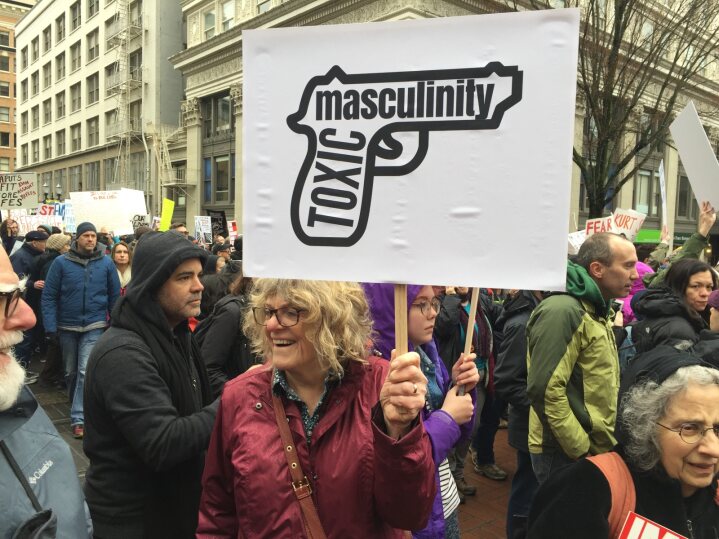Beyond labels: rethinking masculinity without losing ourselves
The conversation keeps shifting on masculinity but are we missing the bigger picture?
By J.A. Aleman
In a postmodern world, especially in the United States, we will always have conversations about redefining aspects of society. This is especially true when it comes to gender and the role it plays in various parts of our day-to-day lives.
People, no matter who they are, will always ask questions about meaning and purpose. Looking at the questions we ask ourselves today, we can see how often throughout recorded history humanity has asked big questions about the human condition.
Perhaps the biggest difference today is that that people have platforms like social media where they are able to express what they think, feel and have experienced. This means information is shared much faster and communities can be built without even making face to face contact.
Masculinity is an example of a subject which has been under much scrutiny. It has been explored and explained and reexplained by science, sociology, theology, philosophy and many more perspectives, from beginner levels of the disciplines to the most expert level.
Still, society can’t seem to find a place where we all agree on what it means to be masculine. I for one see that people need to ask what it means to be human before moving on. That is a much better question, because before anything else we are human. How can we understand anything else about ourselves if we don’t see that as fact?
However, we always come back to this question of gender roles, as people try to find their place in the world.
“It does seem to me that men and women are different, psychologically, biologically and in all sorts of ways men and women are radically different,” said N.T. Wright, Senior Research Fellow at Wycliffe Hall, Oxford University as a guest on the Unbelievable podcast. “I’m not a psychologist, but what I’ve read and what I know is that there is a considerable overlap. Men tend to be this way out and women tend to be that way out, but there are many overlaps and there’s a sense in which they are complimentary.”
Wright also expressed that seeing those differences raises all sorts of questions in the current culture climate of the U.S. and elsewhere.
I have heard arguments where both men and women are interchangeable, such as when a single mom must perform both roles for her children. In a sense, this speaks of men and women being identical, as both can provide the same things to a family. I’ve even heard women living as single moms say they celebrate both Mother’s Day and Father’s Day and I take offence to that.
This is not because women are inferior in any way, but because there is no substitute for what a father gives to a family. This is why there are programs like Big Brothers Big Sisters of America where men and women become mentors and role models to young people.
This tells me there is an understanding that men and woman are different in many ways and youth require guidance when either mom or dad are not in the picture.
We can also look at men’s and women’s sports as an example of a biological difference. In either sport, we can also see differences in personality because there are women who dominate their respective sport and likewise men who are the alphas of theirs.
“You could say with reasonable certainty that one in ten women has a masculine temperament and one in ten men has a feminine temperament and that’s a lot of people,” said Personality Psychologist Jordan Peterson in an interview on Ben Shapiro’s YouTube channel.
In a lecture series on his YouTube channel, Peterson explains that there is overlap between men and women, but we can’t overlook the traits of extraversion, agreeableness and neuroticism as that is where the overlap can be seen.
If Peterson is right, then, can we assume that someone like 7’ 2 Shaqueal O’Neal can go toe to toe with the likes of 6’5 Lisa Leslie in their prime, right? My answer is no. But then again, even the big men in the National Basketball Association had a lot of trouble with the former center.
Traditionally, masculinity has been seen as men taking advantage of their power and using that power to control women and men that are less powerful. The evidence of this can be seen with church and political leaders oppressing members or constituents for their own ends.
From what I’ve seen today, men are willing to look at masculinity in a different way. I for one come from a culture where machismo is only frowned upon in silence. While Latino culture is not the only one to have some form of sexist or misogynistic tradition, it’s something I didn’t want to participate in or hand down to my children.
What helped me see this was my own upbringing, because I saw my mom work, take care of our home and raise her kids while my dad was there. Unfortunately, he was absent in different ways.
My mom was our protector, caregiver and provider. My dad was too, but the only difference was that women in the household raised the kids, resulting in his limited presence in my life. He only got involved when it was too much for my mom to handle.
I have a wonderful dad and have a great relationship with him, but when I was a kid, it was difficult to relate to him.
This is a striking difference from my own children’s current upbringing. My wife and I share all the responsibilities, including raising our children. When our second child was born, my wife found a better career opportunity and we agreed for me to stay home while she worked. I’ve had people compliment me for challenging gender roles, and from another side, I’ve been told I’m not a real man.
I hate both of those things that have been placed upon me. I am not challenging gender norms, nor do I see myself as something less than a man. What my wife and I decided to do was best for our family at the time, and th.at was all. There is no need for praise from one side or disdain from the other. We did what any parents united in building a home would do.
The National Library of Medicine (NLM) did a systemic review of much of the literature about contemporary masculinity and found that inclusivity, emotional intimacy, physicality and resistance were elements in common. This meant that young men, who demonstrate some traditional masculine traits such as asserting heterosexual status, have started to look at expressing their masculinity a little differently.
Despite this fact, we still see women in society say that men are trash. This can make men feel they should hide their masculine traits for fear of offending women. Being masculine does not mean femininity is erased in society.

Nor should masculinity be defined as a power-hungry monster that is willing to do whatever it takes to get whatever it wants. If anything, anyone can become this type of monster. Anyone can be toxic and instead of being someone who uplifts, can be someone who strikes down those around them.
“Masculinity is very flexible. Look at the White House. You got Trump and JD Vance as these new examples of masculinity. Trump’s got his trophy wives. Trump also wears a ton of make-up and listens to the village,” said Dr. Alex Miller, a professor who teaches a course on Masculinity at UW Tacoma.
These sorts of tropes to masculinity are funny to think about because I would never wear makeup but wouldn’t hound a man that does for the television. There are actors who wear make-up and musicians who wear eyeliner but do drugs and get all the groupies.
Men from nomadic people of the Arabian desert wore eyeliner to protect their eyes from the glare of the desert sun, wind and sand, according to a report by CNN. That is not to say those traditional cultural norms are the same as the ones in the U.S., as clearly there are differences in how or why make-up is used.
It’s often used for beautification, or to make a statement of self-expression. Men wearing make-up for various reasons shows that masculinity has extremes and that it also has a purpose.
“We definitely see people, who in their pursuit of masculinity wind up in extremely dangerous behavior, whether its physically transforming your body to look a certain way, having to be the alpha in every situation, alcohol abuse and violence against women. Those are examples of toxic masculinity,” Dr. Miller said.
Still, I teach my son that a man protects those weaker than him and does what is right when the time arrives. I want him to defend anyone he can, not just women and children.
Dr. Miller told the Ledger that we must be careful when attempting to ground masculinity in these vague abstractions such as courage or valor, because they can simultaneously deny or could do harm to femineity.
In part I agree, as I also have a daughter whom I teach to have courage and stand up strong because my wife and I know some of the challenges she will face. Even so, I think back on certain moments in my life when I could be seen as a misogynistic jerk.
I remember working at a pawn shop in my 20s. People would sometimes bring heavy items that could weigh 50lbs or more. I had a supervisor who was a woman, but she was very thin and no more than 5’1 in my estimation.
I prefaced this to say the following. My supervisor began to ask me, a 6 foot over 250lb man to help her with the heavy items. I had no issues at first, but then this started to become the norm. I had an issue with this, because my raises each year were performance based. I earned money based on how many items we pawned and how many items we sold. I was off the sales floor and in the backroom putting away the items that customers pawned to me and my supervisor.
I complained about the problem because even the application for her role had lifting more than 50lbs consistently as a requirement, so she wasn’t really qualified. Before you call me a jerk, I’m not saying all women couldn’t do the job, but clearly my supervisor could not perform some of her duties consistently.
It is possible to say someone can’t do something without degrading an entire group of people. This is why I stated above that we need to ask the question of what it means to be human. Once we answer this, then we can begin to tackle the differences and similarities and overlaps that we all possess, without erasing or dominating each other.
To be human means to be a protector, provider, partner and giver. There are many more traits we all possess from either side, but we can’t diminish masculinity or femineity for the sake of our own gain. Instead, we should all find a way to understand that masculinity and femineity don’t have to be toxic. Rather, they are beneficial to society because they complement one another.






